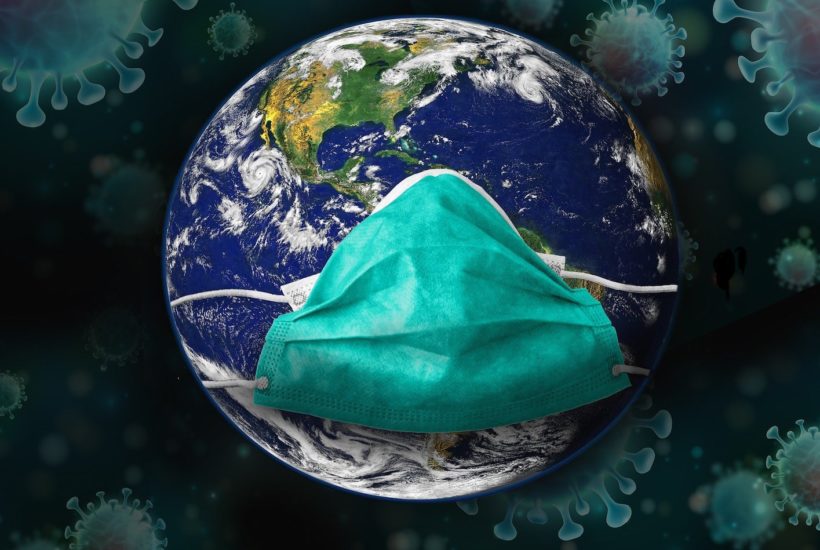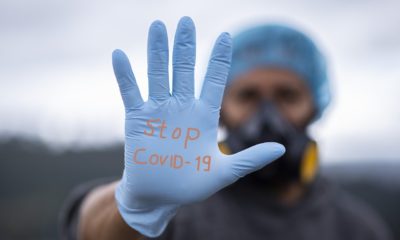Featured
Innovation against COVID-19: a smart recyclable mask that disinfects itself
A Spaniard has created a mask capable of detecting nearby coronavirus outbreaks and which, being transparent, facilitates non-verbal communication. The element of sustainability is given by its reusable character. It also uses antimicrobial and bio-active filters that are not harmful to the environment once their life cycle is over. The mask is dismountable and each of its materials is recyclable.

Italy’s confinement during the first wave of the new coronavirus pandemic in March was, like Spain’s, one of the strictest in the world. There were those who, locked up in their homes without knowing how long, organized an overactive schedule of teleworking, sports at home, DIY and virtual parties. There were those who had their world come crashing down on them and could hardly manage to carry out their daily duties in this claustrophobic situation. In the case of a Hispanic-Italian couple, they decided to invent the definitive mask against the virus.
“We wanted to do our bit for the situation,” said Alvaro Gonzalez Romero-Dominguez. Together with his partner, the designer Simona Lacagnina, they have created an intelligent mask capable of self-disinfection, measuring air quality and alerting nearby coronavirus outbreaks.
Find out more about the smart recyclable mask invented by a Spanish couple and read the most important financial headlines with the Born2Invest mobile app.
The intelligent mask, called Cliu, is based on three pillars: inclusiveness, sustainability and technology
First, they wanted to develop an inclusive product because, recalled González, “people with hearing problems are used to reading other people’s lips when they speak.” A transparent screen with an anti-fog system is intended to break down this barrier to communication which, in reality, has become the daily routine of a large part of the world’s population. “We are experiencing it in the first person,” explained González. “A simple smile is hidden behind the mask, it is not transmitted.”
The element of sustainability is given by its reusable character, on the one hand, and also uses filters “antimicrobial and bioactive, that is, that are not harmful to the environment once their life cycle is over.” The mask is dismountable and each of its materials is recyclable. “At the same time”, the Spanish designer pointed out, “the materials are biomedical, anti-allergenic and certified.”
Concern about the avalanche of plastics and other non-biodegradable materials being dumped into nature has grown as the mask has been incorporated into the new normality in more and more parts of the planet. In most of Spain, for example, it is mandatory to wear it on the street, despite the stifling summer heat and even when taking walks on the beach.
“We read in an article that soon there would be more disposable masks in the sea than jellyfish,” said González. From that concern was born the agreement with the SEADS organization to allocate part of the profits from the first 20,000 masks sold to the construction of a barrier that would block the passage of plastics in the Arno River in Tuscany.
Thirdly, the technological element consists of the mask’s ability to measure air quality, pollution and active coronavirus outbreaks around it, among other things. Moreover, the premium version includes microphones and a number of algorithms to measure breathing quality and heart rate. “This would help in preventing respiratory diseases and is especially good for people with allergies, for example, or immunodeficiency,” said González.
A mask that disinfects itself
The standard version can be dismantled and, as it can withstand temperatures of up to 200 degrees, put in the dishwasher, washing machine, or even the microwave. In the case of the more expensive mask, explained González, “it has a charging base with ultraviolet light that makes it possible to disinfect it in a matter of minutes.”
The project was initiated through a crowdfunding campaign and it will be these initial sponsors who will receive – probably in October – the first batch of 2,000 masks. The premium version will take another month, the designers calculated. “This has gone so viral that we are almost sleepless so that everything will be ready as soon as possible,” said González.
According to the creators, the price of the standard smart mask will be around $105.6 (€90), while the premium version will go up to $293 (€250). The question is how many of the most impoverished sectors in the Latin American region will be able to afford this purchase, or whether governments could implement public programs to subsidize it and thus protect broad strata of the population without access to teleworking, for example.
The first wave of smart masks will therefore reach buyers in just over two months in more than 65 countries. Many of them will land in Latin America, which this July has become the global focus of the pandemic. The Spaniard said they have had numerous sponsors from “practically all the countries of Latin America, especially Mexico, Peru and Colombia.”
The next to have access to Cliu will be some 20,000 people who have booked the product from the project’s website. Later on, González explained, “we are planning an e-commerce website so that, once we are more structured, we can start selling internationally.”
__
(Featured image by Alexandra_Koch via Pixabay)
DISCLAIMER: This article was written by a third party contributor and does not reflect the opinion of Born2Invest, its management, staff or its associates. Please review our disclaimer for more information.
This article may include forward-looking statements. These forward-looking statements generally are identified by the words “believe,” “project,” “estimate,” “become,” “plan,” “will,” and similar expressions. These forward-looking statements involve known and unknown risks as well as uncertainties, including those discussed in the following cautionary statements and elsewhere in this article and on this site. Although the Company may believe that its expectations are based on reasonable assumptions, the actual results that the Company may achieve may differ materially from any forward-looking statements, which reflect the opinions of the management of the Company only as of the date hereof. Additionally, please make sure to read these important disclosures.
First published in DW, a third-party contributor translated and adapted the article from the original. In case of discrepancy, the original will prevail.
Although we made reasonable efforts to provide accurate translations, some parts may be incorrect. Born2Invest assumes no responsibility for errors, omissions or ambiguities in the translations provided on this website. Any person or entity relying on translated content does so at their own risk. Born2Invest is not responsible for losses caused by such reliance on the accuracy or reliability of translated information. If you wish to report an error or inaccuracy in the translation, we encourage you to contact us.

-

 Cannabis2 weeks ago
Cannabis2 weeks agoKONOPEX Expo 2026: Celebrating Europe’s New Era of Legal Cannabis
-

 Biotech2 days ago
Biotech2 days agoVolatile Outlook for Enlivex Therapeutics as Investors Await Clinical Catalysts
-

 Impact Investing1 week ago
Impact Investing1 week agoInter IKEA Launches Electric Truck Fleet to Decarbonize Heavy-Duty Logistics in Italy
-

 Markets4 days ago
Markets4 days agoCotton Market Weakens Amid Demand Concerns and Bearish Trends
























